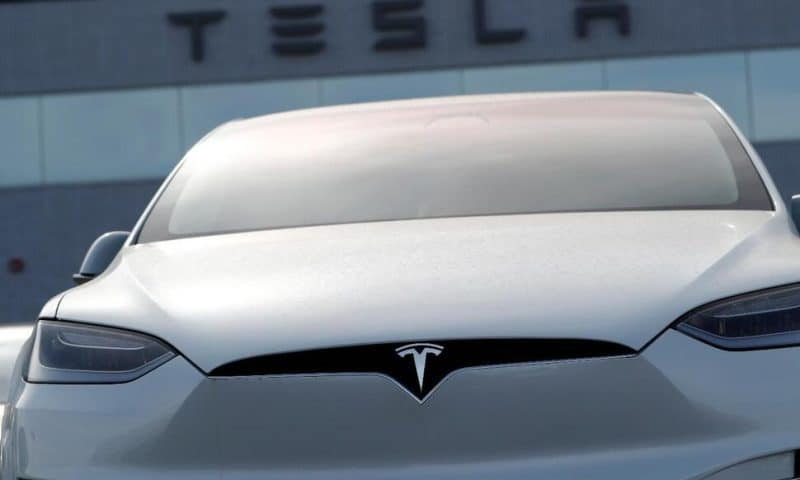Price reductions across the model lineup cut into Tesla’s first-quarter net income, causing it to fall 24% from a year ago
DETROIT — Tesla’s first-quarter net income tumbled 24% from a year ago as multiple price cuts across its model lineup reduced the amount of money generated per vehicle even as sales rose.
The Austin, Texas, electric car and solar panel company said Wednesday it made $2.51 billion from January through March, down from $3.32 billion a year ago. Revenue rose 24% to $23.33 billion, but the company’s operating profit margin fell.
Tesla made an adjusted 85 cents per share in the first quarter, matching analyst estimates, according to FactSet. Analysts had expected profits to fall because of the price cuts.
CEO Elon Musk hinted that price cuts may not be over. He told analysts that Tesla evaluates them daily and wants to keep producing the maximum number of vehicles possible to increase its world-leading electric vehicle market share.
“Orders are in excess of production,” he said when asked what happened to orders since recent price cuts were announced.
Early in the quarter Tesla reduced U.S. prices on many of its models, then did it a second time early in March. The company slashed U.S. prices two more times in April, including overnight Wednesday, in an effort to boost demand. It trimmed them in Europe as well.
The net income drop came even though Tesla’s sales last quarter rose 36% to a record 422,875 vehicles worldwide. That’s largely because the average sale price per vehicle fell just over $5,000 from the first quarter of 2022 due to the price cuts. Analysts estimated that the average Tesla sold for $46,850 last quarter, down from $52,100 a year earlier.
The company produced nearly 18,000 more vehicles than it sold during the quarter, indicating softening demand.
Tesla’s first-quarter operating margin fell from 19.2% in the first quarter of last year to 11.4% this quarter.
Musk said Tesla wants to sell more vehicles at lower prices so it later can take in revenue from software, service and its $15,000 “Full Self-Driving” system that will turn cars into robotaxis and increase their value.
Despite the name, the cars cannot drive themselves, and Tesla warns drivers that they have to be ready to intervene at all times.
“The trend is very clearly toward full self-driving,” Musk said. “And I hesitate to say this, but I think we’ll do it this year.”
In 2019, Musk promised a fleet of autonomous robotaxis by 2020, and he said early last year that the cars would be autonomous in 2022. Since 2021, Tesla has been using owners to beta test “Full Self-Driving” on public roads.
But Tesla’s partially automated driving systems are coming under increasing scrutiny from U.S. safety regulators. The National Highway Traffic Safety Administration has sent investigative teams to more than 30 crashes since 2016 in which Teslas suspected of operating on Autopilot or “Full Self-Driving” have struck pedestrians, motorcyclists, semi trailers and parked emergency vehicles. At least 14 people were killed in the crashes.
In addition, NHTSA in February pressured Tesla into recalling nearly 363,000 vehicles with “Full Self-Driving” software because the system can break traffic laws. The agency said in documents that the system can make unsafe actions such as traveling straight through an intersection from a turn-only lane or going through a yellow traffic light without proper caution. The problems were to be fixed with an online software update.
The Justice Department also has asked Tesla for documents about “Full Self-Driving” and Autopilot.
In its earnings release, Tesla said it’s aiming to leverage its position as a cost leader as other automakers try to handle electric vehicle costs.
“Although we implemented price reductions on many vehicle models across regions in the first quarter, our operating margins reduced at a manageable rate,” the company said.
The company said it expects to reduce costs on its vehicles with improved production efficiency at its new factories and with lower shipping costs.
Analysts had been watching for whether the price cuts would affect Tesla’s income and profit margins for the quarter amid rising interest rates and pesky inflation. The average new vehicle loan in the U.S. is now at 7%, according to Edmunds.
Tesla said its Model Y small SUV was the top-selling non pickup truck in the U.S. during the quarter, but it didn’t give numbers.
Shares of Tesla, which fell 2% during the trading day Wednesday, dropped 6% more in extended trading after the earnings were released.
Overnight Wednesday, Tesla lopped $3,000 off the U.S. starting prices of all versions of the Model Y, its top-selling model. The cuts dropped the lowest-priced Dual Motor model to $46,990. The Model 3 Rear Wheel Drive, Tesla’s lowest-priced vehicle, saw a cut to $39,990.

